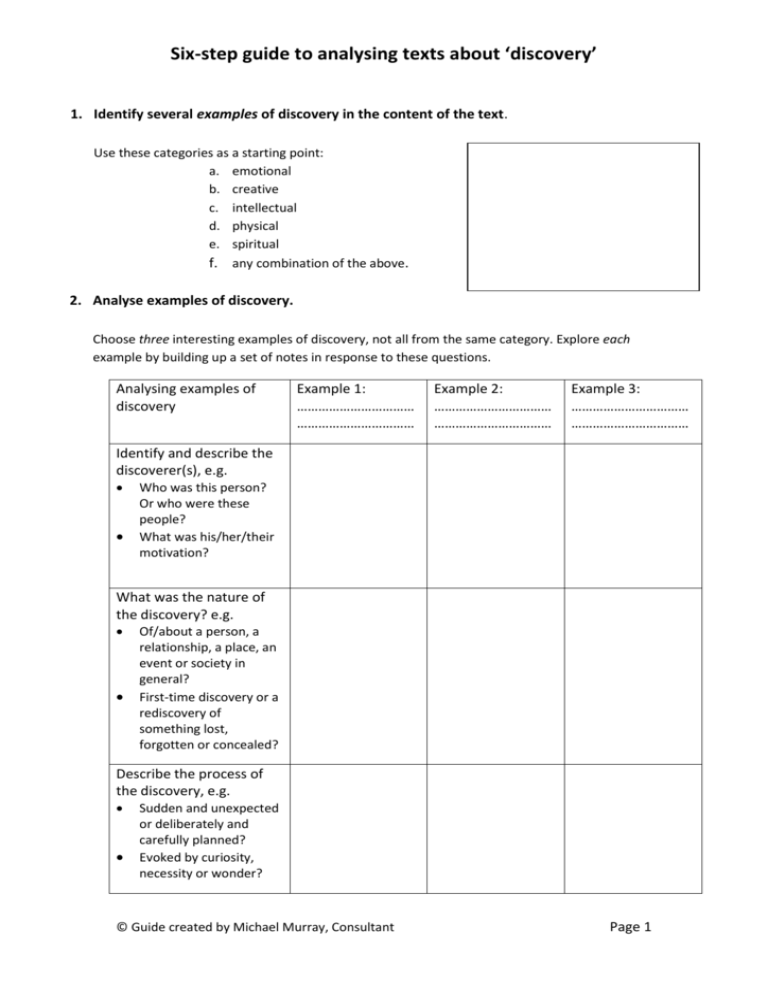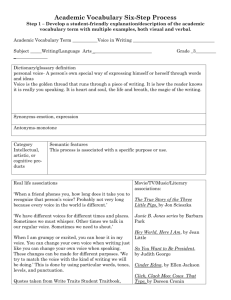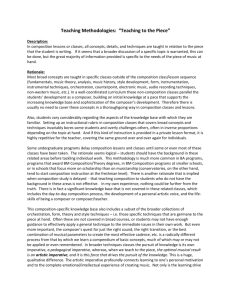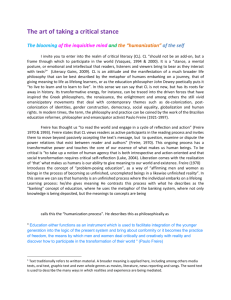Six-step guide to analysing texts about *discovery*
advertisement

Six-step guide to analysing texts about ‘discovery’ 1. Identify several examples of discovery in the content of the text. Use these categories as a starting point: a. emotional b. creative c. intellectual d. physical e. spiritual f. any combination of the above. 2. Analyse examples of discovery. Choose three interesting examples of discovery, not all from the same category. Explore each example by building up a set of notes in response to these questions. Analysing examples of discovery Example 1: …………………………… …………………………… Example 2: …………………………… …………………………… Example 3: …………………………… …………………………… 1. Identify and describe the discoverer(s), e.g. Who was this person? Or who were these people? What was his/her/their motivation? 2. What was the nature of the discovery? e.g. Of/about a person, a relationship, a place, an event or society in general? First-time discovery or a rediscovery of something lost, forgotten or concealed? 3. Describe the process of the discovery, e.g. Sudden and unexpected or deliberately and carefully planned? Evoked by curiosity, necessity or wonder? © Guide created by Michael Murray, Consultant Page 1 Six-step guide to analysing texts about ‘discovery’ 4. What was the response to the discovery? e.g. Welcome and meaningful, or confronting and provocative? Emotional or intellectual? 5. What were the ramifications of the discovery? e.g. Personally or more widely significant? Short term and long term? 6. To what extent was the experience of discovery shaped by particular contexts and values? e.g. Personal Cultural Historical Social 3. Identify main ideas about discovery. Overall, what ideas about discovery are being presented in the text? Does the text affirm or challenge your (or more widely held) assumptions and beliefs about aspects of human experience and the world? In what ways has this text deepened your understanding of the concept of discovery? © Guide created by Michael Murray, Consultant Page 2 Six-step guide to analysing texts about ‘discovery’ 4. How is the concept of discovery represented in the text? Consider: - structure language other textual features. Focus in particular on how the composer has exploited the particular features of the medium or type of text. For each technique: - identify example(s) explain the effect evaluate the effectiveness of the technique as used by the composer. Consider the medium and technology in which the text was created. How do these factors affect what the text says about discovery and the impact of what it says? Technique Example(s) Explain effect © Guide created by Michael Murray, Consultant Evaluate effectiveness Page 3 Six-step guide to analysing texts about ‘discovery’ 5. Describe the experience of discovery through engagement with the text. What did you discover, as against what characters or people in the text discovered? How did the composer shape your experience of textual discovery? To what extent was your experience of textual discovery the result of your own personal context? 6. How did the composer’s context influence the concept of discovery and how it is represented in the text? When and where was the text composed? What were the social/political circumstances of this context? What do you know about the composer’s personal context? How does an understanding of context help us to understand the views about discovery and the ways these views are presented in the text? © Guide created by Michael Murray, Consultant Page 4











